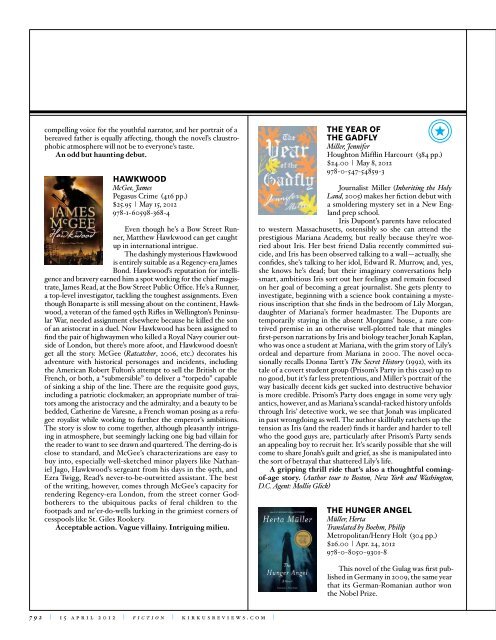nonfiction
nonfiction
nonfiction
You also want an ePaper? Increase the reach of your titles
YUMPU automatically turns print PDFs into web optimized ePapers that Google loves.
compelling voice for the youthful narrator, and her portrait of a<br />
bereaved father is equally affecting, though the novel’s claustrophobic<br />
atmosphere will not be to everyone’s taste.<br />
An odd but haunting debut.<br />
HAWKWOOD<br />
McGee, James<br />
Pegasus Crime (416 pp.)<br />
$25.95 | May 15, 2012<br />
978-1-60598-368-4<br />
Even though he’s a Bow Street Runner,<br />
Matthew Hawkwood can get caught<br />
up in international intrigue.<br />
The dashingly mysterious Hawkwood<br />
is entirely suitable as a Regency-era James<br />
Bond. Hawkwood’s reputation for intelligence<br />
and bravery earned him a spot working for the chief magistrate,<br />
James Read, at the Bow Street Public Office. He’s a Runner,<br />
a top-level investigator, tackling the toughest assignments. Even<br />
though Bonaparte is still messing about on the continent, Hawkwood,<br />
a veteran of the famed 95th Rifles in Wellington’s Peninsular<br />
War, needed assignment elsewhere because he killed the son<br />
of an aristocrat in a duel. Now Hawkwood has been assigned to<br />
find the pair of highwaymen who killed a Royal Navy courier outside<br />
of London, but there’s more afoot, and Hawkwood doesn’t<br />
get all the story. McGee (Ratcatcher, 2006, etc.) decorates his<br />
adventure with historical personages and incidents, including<br />
the American Robert Fulton’s attempt to sell the British or the<br />
French, or both, a “submersible” to deliver a “torpedo” capable<br />
of sinking a ship of the line. There are the requisite good guys,<br />
including a patriotic clockmaker; an appropriate number of traitors<br />
among the aristocracy and the admiralty; and a beauty to be<br />
bedded, Catherine de Varesne, a French woman posing as a refugee<br />
royalist while working to further the emperor’s ambitions.<br />
The story is slow to come together, although pleasantly intriguing<br />
in atmosphere, but seemingly lacking one big bad villain for<br />
the reader to want to see drawn and quartered. The derring-do is<br />
close to standard, and McGee’s characterizations are easy to<br />
buy into, especially well-sketched minor players like Nathaniel<br />
Jago, Hawkwood’s sergeant from his days in the 95th, and<br />
Ezra Twigg, Read’s never-to-be-outwitted assistant. The best<br />
of the writing, however, comes through McGee’s capacity for<br />
rendering Regency-era London, from the street corner Godbotherers<br />
to the ubiquitous packs of feral children to the<br />
footpads and ne’er-do-wells lurking in the grimiest corners of<br />
cesspools like St. Giles Rookery.<br />
Acceptable action. Vague villainy. Intriguing milieu.<br />
THE YEAR OF<br />
THE GADFLY<br />
Miller, Jennifer<br />
Houghton Mifflin Harcourt (384 pp.)<br />
$24.00 | May 8, 2012<br />
978-0-547-54859-3<br />
Journalist Miller (Inheriting the Holy<br />
Land, 2005) makes her fiction debut with<br />
a smoldering mystery set in a New England<br />
prep school.<br />
Iris Dupont’s parents have relocated<br />
to western Massachusetts, ostensibly so she can attend the<br />
prestigious Mariana Academy, but really because they’re worried<br />
about Iris. Her best friend Dalia recently committed suicide,<br />
and Iris has been observed talking to a wall—actually, she<br />
confides, she’s talking to her idol, Edward R. Murrow, and, yes,<br />
she knows he’s dead; but their imaginary conversations help<br />
smart, ambitious Iris sort out her feelings and remain focused<br />
on her goal of becoming a great journalist. She gets plenty to<br />
investigate, beginning with a science book containing a mysterious<br />
inscription that she finds in the bedroom of Lily Morgan,<br />
daughter of Mariana’s former headmaster. The Duponts are<br />
temporarily staying in the absent Morgans’ house, a rare contrived<br />
premise in an otherwise well-plotted tale that mingles<br />
first-person narrations by Iris and biology teacher Jonah Kaplan,<br />
who was once a student at Mariana, with the grim story of Lily’s<br />
ordeal and departure from Mariana in 2000. The novel occasionally<br />
recalls Donna Tartt’s The Secret History (1992), with its<br />
tale of a covert student group (Prisom’s Party in this case) up to<br />
no good, but it’s far less pretentious, and Miller’s portrait of the<br />
way basically decent kids get sucked into destructive behavior<br />
is more credible. Prisom’s Party does engage in some very ugly<br />
antics, however, and as Mariana’s scandal-racked history unfolds<br />
through Iris’ detective work, we see that Jonah was implicated<br />
in past wrongdoing as well. The author skillfully ratchets up the<br />
tension as Iris (and the reader) finds it harder and harder to tell<br />
who the good guys are, particularly after Prisom’s Party sends<br />
an appealing boy to recruit her. It’s scarily possible that she will<br />
come to share Jonah’s guilt and grief, as she is manipulated into<br />
the sort of betrayal that shattered Lily’s life.<br />
A gripping thrill ride that’s also a thoughtful comingof-age<br />
story. (Author tour to Boston, New York and Washington,<br />
D.C. Agent: Mollie Glick)<br />
THE HUNGER ANGEL<br />
Müller, Herta<br />
Translated by Boehm, Philip<br />
Metropolitan/Henry Holt (304 pp.)<br />
$26.00 | Apr. 24, 2012<br />
978-0-8050-9301-8<br />
This novel of the Gulag was first published<br />
in Germany in 2009, the same year<br />
that its German-Romanian author won<br />
the Nobel Prize.<br />
Müller was born in 1953 and raised in a German-speaking<br />
enclave of Romania. In 1945 the Red Army had deported thousands<br />
from these enclaves to forced labor camps on the Russian<br />
steppe. Years later, the recollections of one of the former<br />
deportees inspired her to write this novel. Her narrator, 17-yearold<br />
Leo Auberg, has just started having sex with men in the park,<br />
fearfully, risking jail; when the soldiers come calling, he’s glad<br />
to escape his watchful small town. That gladness disappears on<br />
the cattle cars. Dignity goes too, as the deportees are ordered<br />
off the train to do their business in a snowy field. What follows<br />
are dozens of short sections as Leo riffs on conditions in the<br />
camp. He will do different kinds of work: unloading coal, servicing<br />
the boilers, loading pitch in a trench. That last assignment<br />
is life-threatening, but before he succumbs to a fever Leo<br />
notes that “the air shimmered, like an organza cape made of<br />
glass dust.” The poetic sensibility sets the novel apart. There<br />
is a much-hated adjutant, a German like themselves, but it is<br />
hunger, death’s henchman, that is their greatest adversary. Leo<br />
fights it in practical ways: begging door to door, saving or trading<br />
his bread (echoes of Solzhenitsyn). But he also uses a kind<br />
of reverse psychology when he calls this devil hunger an angel.<br />
The inversion is crucial to Leo’s morale and survival. Keep the<br />
enemy off balance. Flatter him; be gallant. This may sound<br />
whimsical, but there is steel in the writing.<br />
Müller’s work is not without flaws. Leo’s sexual orientation<br />
is not well integrated into the narrative; his post-camp<br />
experiences are too compressed. The novel is still a notable<br />
addition to labor camp literature.<br />
CHILDREN IN<br />
REINDEER WOODS<br />
Ómarsdóttir, Kristín<br />
Translated by Smith, Lytton<br />
Open Letter (198 pp.)<br />
$14.95 paperback | Apr. 17, 2012<br />
978-1-934824-35-1<br />
A literary allegory filled with truths and<br />
absurdities about the human condition.<br />
An unspecified army invades an<br />
unspecified country. Three soldiers arrive<br />
at a farm that is also a “temporary home for children” named<br />
Children in Reindeer Woods. Without apparent motive, they<br />
murder everyone except an 11-year-old girl, Billie. Then the<br />
soldier named Rafael murders his comrades. Now he wants to<br />
stop killing and become a farmer. Billie is oddly unmoved by<br />
the killings and becomes his (platonic) companion as he tries to<br />
remake himself into a peaceful human being. Meanwhile, puppet<br />
masters on another planet pull strings as they try to manipulate<br />
events on Earth. This novel, translated from the Icelandic,<br />
takes getting used to. Many phrases are repeated numerous<br />
times, giving the story a strange cadence not often seen in Western<br />
literature. The characters are not from a particular country<br />
or a particular culture; they are from everywhere or anywhere<br />
or nowhere. Rafael wants to transform himself from every-soldier<br />
to everyman. Can he go from blowing up bombs to helping<br />
Billie play with her Barbies Others pass through Reindeer<br />
Woods, such as the wandering nun who stays overnight and<br />
either sleeps with Rafael or doesn’t. Rafael shoots off one of his<br />
toes every time he fails to live up to his own standards, but pain,<br />
bleeding and infection seem not to hobble him as he tends his<br />
cows and sheep. Despite all the bodies Rafael buries, there is<br />
also humor buried in the tale—not hilarity, but perhaps a few<br />
wry smiles at mankind’s foibles.<br />
This is the first of Icelandic author Ómarsdóttir’s novels<br />
to appear in English, and it shouldn’t be the last. Somewhere<br />
in the reader’s mind, Catch-22 echoes faintly.<br />
MORE LIKE HER<br />
Palmer, Liza<br />
Morrow/HarperCollins (336 pp.)<br />
$14.99 paperback | Apr. 17, 2012<br />
978-0-06-200746-9<br />
After escaping death in a school shooting,<br />
a mild-mannered woman begins to<br />
demand a little respect.<br />
New headmistress in the Markham<br />
School Emma Dunham is beautiful and<br />
accomplished—a kind of Grace Kelly<br />
figure in the stuffy staff lounge. She is just the kind of woman<br />
speech therapist Frannie Reid would like to be, but that would<br />
require a kind of easy confidence she can’t imagine. Frannie does<br />
have a cheering team—Jill, a fellow therapist at Markham, and<br />
Lisa, a new science teacher. Their relationship is palpable—they<br />
swear and joke and snipe like real friends—and the two encourage<br />
Frannie to date since pompous Ryan, head of the history<br />
department, dumped her. On a rare faculty night out, she meets<br />
Sam. An architect working on an expansion to the school, he is<br />
handsome, has a lovely Southern drawl and really gets Frannie.<br />
It feels like kismet until the night of Emma Dunham’s birthday<br />
party at the school. Emma’s creepy husband Jamie walks in and<br />
shoots Emma in the head. He spins around and begins aiming<br />
at anyone close enough, and then Sam gets hold of the gun and<br />
shoots. Afterward Sam goes home with Frannie to change out<br />
of their bloody clothes, and they have desperate, frightened,<br />
bone-shattering, love-inducing sex. And then, they don’t see<br />
each other for a very long time. Sam is coming to terms with<br />
having killed a man (while being praised as a hero) and Frannie<br />
is wondering why the woman she wanted to emulate turned out<br />
to be an abused wife. Although the romance between Sam and<br />
Frannie has pull, Palmer spins a few enticing subplots: Frannie<br />
adopts Emma’s beautiful dog, Lisa and fellow architect Grady<br />
decide to marry after the shock of the shooting, Frannie contacts<br />
Emma’s estranged sister and finds that their childhood<br />
primed Emma for a life of abuse. All this has to happen before<br />
Frannie and Sam can decide whether their relationship can survive<br />
the shooting.<br />
Palmer brings wit and wisdom to her tale of love, damage<br />
and self-acceptance. (California regional author appearances)<br />
792 | 15 april 2012 | fiction | kirkusreviews.com |<br />
| kirkusreviews.com | fiction | 15 april 2012 | 793






